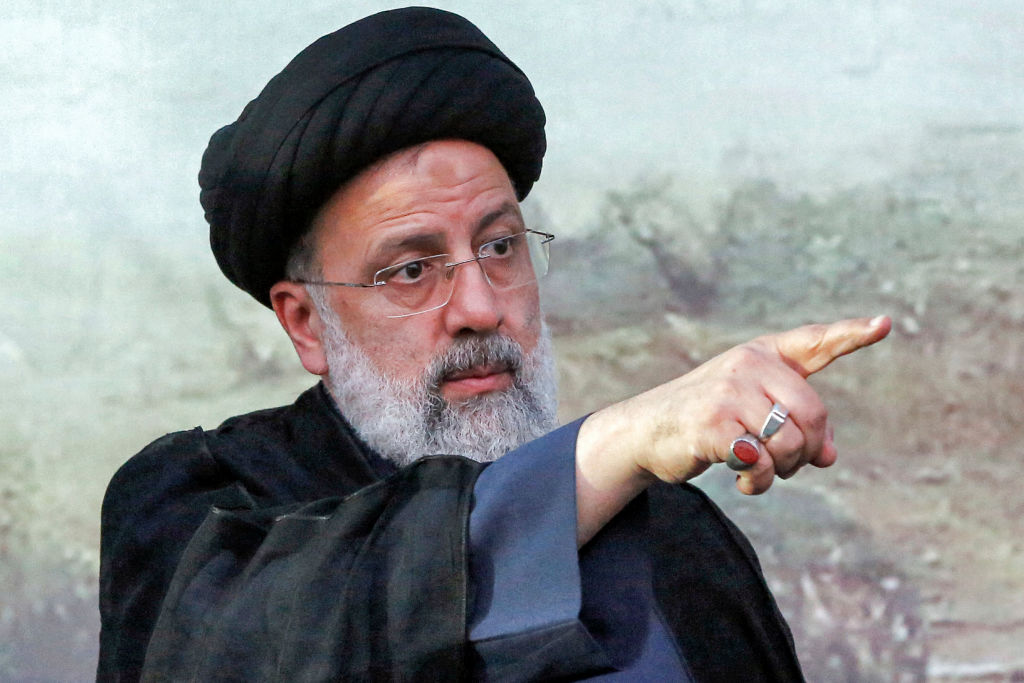The deaths of two of Iran’s most powerful hardline politicians — President Ebrahim Raisi and Foreign Minister Hossein Amir-Abdollahian — in a helicopter crash yesterday have sent shockwaves through the country. While Raisi’s death is unlikely to have an immediate impact in policy terms, given that Supreme Leader Ali Khamenei makes the final decision on virtually every aspect of Iranian power and politics, when viewed in context it could tip the country’s regime off balance in a way not experienced since the 1979 revolution.
The first and most obvious factor at play is Iran’s shadow war with Israel, which in recent months has moved into the glare of full geopolitical daylight. The culmination of this came last month, with a direct Iranian attack on Israel followed by an Israeli retaliation.
Iran’s attack, which included hundreds of drones and missiles, was itself a response to Israel’s assassination earlier in April of a senior general in Iran’s Islamic Revolutionary Guards Corps in Syria, Mohammad Reza Zahedi. That strike followed the assassination of another powerful Iranian general, Seyed Razi Mousavi, in December, a month before the killing of three Iranian generals in January.
What’s notably and perhaps tellingly absent from discussions of Raisi’s death, barring some chatter on social media, are accusations of “Zionist” machinations. Since the inception of the Islamic Republic, the regime has positioned Mossad as a malign, unseen hand guiding all anti-Iranian activities. Officials have taken this to extreme lengths, once going so far as to assert that Mossad used lizards to spy on the country’s nuclear programme.
Yet Israeli intelligence has as yet received no official blame for Raisi’s death. This is likely due to the fact that were it to be believed that Israel orchestrated the assassination, the Iranian regime would appear to the outside world, and to the Iranian people where dissent is at a boil, disastrously vulnerable.
This might well be the case. Even without any evidence that Israel is behind Raisi’s death, Iran’s conditioned reflex of blaming its regional rival for virtually everything will mean that many in the country, including its upper political echelon, will naturally believe that Israel is to blame. This will have a chilling effect on the country’s ability to project power across the Middle East.
Over the past few decades, Iran has effectively constructed an “Axis of Resistance”, otherwise known as the Shia Crescent, stretching from Tehran in the east, through Syria and Lebanon, into Yemen and Gaza, where Iran serves as the primary backer of Hamas. Indeed, there have been reports that the late Zahedi was an “architect” of Hamas’s terror attack on 7 October.
While the Axis depends on a supply of money and arms, it is primarily an ideological construct built on relationships. When Donald Trump ordered the assassination of Qasem Soleimani, the original and most celebrated engineer of the Axis of Resistance, in 2020, the structure shook but did not fall.
Yet the subsequent deaths of Mousavi, Zahedi and now Amir-Abdollahian and Raisi amount to an unravelling of the organisational ligature holding the Axis together. With each death, Iran loses a network of relationships in which each deceased official served as a primary node, as well as decades of irreplaceable institutional knowledge and the workings of carefully laid planning for future activity.
The shadow inevitably cast by Raisi’s death will also serve as a reminder to the regime’s political elite that they are not immune. While the generals might have once dismissed the targeting of Iranian nuclear scientists as limited in scope, and the politicians may have done the same regarding the deaths of high-ranking generals, the political class can only assume that everyone is game.
In practice, this means Iran will think twice about sending missions of senior officials to Syria, Lebanon or Yemen to cement relationships, establish supply lines, and generally advance the objectives of its global terror web. This means it will fall back on using communications inherently more vulnerable to spying. But it also means that the direct relationships on which the Axis is built will be significantly degraded.
Finally, and perhaps most importantly, Raisi’s death — which is already being celebrated across Iran despite the grave risk — will show the Iranian people, conditioned by the regime to see the influence of Mossad everywhere, that the leadership is not just vulnerable but fragile. In a country roiling from an annual inflation rate approaching 70% as it battles Isis as well as numerous breakaway groups, that can leave a deadly impression.











Join the discussion
Join like minded readers that support our journalism by becoming a paid subscriber
To join the discussion in the comments, become a paid subscriber.
Join like minded readers that support our journalism, read unlimited articles and enjoy other subscriber-only benefits.
Subscribe